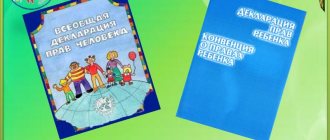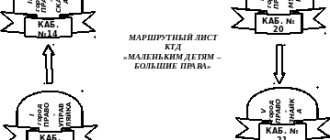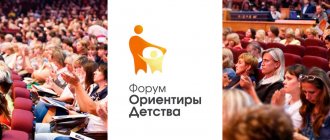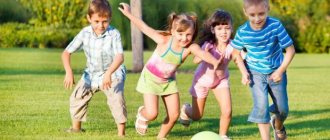Home / Family law / Children's rights
Back
Published: 08/14/2018
Reading time: 6 min
0
490
Preschool education is a wonderful opportunity for a child to socialize, make friends and discover their talents and abilities. But only if his rights are properly respected by the kindergarten employees.
- How does the state ensure the rights of a young citizen?
- The child’s right to creative development
- The right to games and proper rest within the preschool educational institution
- The state protects the life and health of children in the kindergarten
- Protection of interests
- Examples of violation of rights in preschool educational institutions
- Are there ways to find out about a violation of a child's rights?
- Parents' rights
The parent must know what exactly the child has the right to claim while staying there in order to stop possible violations.
How does the state ensure the rights of a young citizen?
A small child, like any citizen of the country, has his own rights and freedoms, which are guaranteed by the state and should not be violated.
They are determined by the list of regulatory documents of the Russian Federation:
- Convention on the Rights of the Child , signed by UN countries on November 20, 1989. Russia also signed this international document;
- Federal Law-273 “On Education” dated December 29, 2012;
- Federal Law-124 “On the basic guarantees of the rights of the child in the Russian Federation” dated July 24, 1998;
- Declaration of the Rights of the Child of November 20, 1959;
- Family Code of the Russian Federation.
Before sending a child to a preschool educational institution (PED), parents should familiarize themselves with the basic rights of the child so that they are correctly implemented by the teaching staff of the kindergarten.
Consultation for parents “On the rights of a preschool child”
Maria Eryomicheva
Consultation for parents “On the rights of a preschool child”
Dear parents ! We want to touch upon a very important and pressing issue related to the protection of the rights and dignity of a small child, and also consider the rights and responsibilities of parents in relation to the child.
Preschool childhood is a unique period in a person’s life, during which health is formed and personality develops. At the same time, this is a period during which the child is completely dependent on the adults around him - parents and teachers . The health of children and their full development is largely determined by the effectiveness of protecting their rights . A child deprived of care and attention has no second opportunity for normal growth and healthy development,
"The world's children are innocent, vulnerable and dependent"
,
states the World Declaration on the Survival, Protection and Development of Children. In accordance with this provision, the international community for the protection rights has adopted important documents designed to ensure the protection rights throughout the world:
The main international UNICEF documents related to children's rights include :
Declaration of the Rights of the Child (1959)
;
UN Convention on the Rights of the Child (1989)
;
World Declaration on the Survival, Protection and Development of Children (1990)
.
The Declaration of the Rights of the Child is the first international document. The 10 principles set out in the Declaration proclaim the rights of children : to a name, citizenship, love, understanding, material security, social protection and the opportunity to receive education, develop physically, morally and spiritually in conditions of freedom and dignity.
The Declaration pays special attention to the protection of the child. Based on the Declaration of the Rights of the Child, an international document was developed - the Convention on the Rights of the Child .
The Convention recognizes that every child, regardless of race, color, sex, language, religion, political or other opinion, national, ethnic or social origin, has the legal right :
- for education;
— for development;
- for defense
The Convention links the rights of the child with the rights and responsibilities of parents and other persons responsible for the lives of children, their development and protection, and provides the child with the right to participate in decisions affecting his present and future.
The Convention on the Rights of the Child is a legal document of high international standard and great pedagogical significance. It proclaims the child to be a full-fledged and full-fledged personality , an independent subject of law , and calls for building relationships between an adult and a child on moral and legal standards , which are based on genuine humanism, democracy, respect and careful attitude towards the child’s personality, his opinions and views.
“Protecting rights begins with respect for the fundamental provisions of the Convention on the Rights of the Child "
A child is considered a person who has not reached the age of 18, unless by law he has become an adult earlier (Article 1)
.
All children are equal in their rights (Article 2)
.
Children have the same rights regardless of gender , skin color, religion, origin, financial status and other differences.
The interests of the child must come first (Article 3)
.
The state, when making decisions affecting the interests of children, takes into account the rights of the child in the first place.
Right to life (Article 6)
. No one can take the life of a child or make an attempt on his life. The state is obliged to ensure the survival and healthy development of the child to the maximum extent possible.
The right of the child to be cared for by his parents (Article 7)
.
Every child has the right to a name and nationality at birth, as well as the right to know and be cared for by their parents .
The right to preserve one’s individuality (Article
. Each child is one of a kind; with all his features of appearance, character, name, family connections, dreams and aspirations.
Right to freely express one's opinion (Article 12, 13)
the child can express his views and opinions.
In the exercise of these and reputations of others
must be respected Right to protection from physical or psychological violence, insult, harsh or negligent treatment (Article 19)
.
The state must protect the child from all types of violence, neglect and abuse by parents , as well as help a child who has been abused by adults.
Right to health (Article 24)
.
Every child has the right to protect their health: to receive medical care, clean drinking water and nutritious food.
Right to protection from ill-treatment (Article 34)
. The State shall ensure that no child is subjected to torture, ill-treatment, unlawful arrest or imprisonment.
Right to education and school discipline through methods that respect the dignity of the child (Article 28)
Every child has
the right to education . Primary education should be compulsory and free, secondary and higher education should be accessible to all children. Schools must respect the rights of the child and show respect for his or her human dignity.
Right to protection from abuse (Article 34)
. The State shall ensure that no child is subjected to torture, ill-treatment, unlawful arrest or imprisonment.
The following can be considered a violation of the rights of a child:
- deprivation of freedom of movement,
- a parent leaving home for several hours and leaving the child alone (Article 156 of the Criminal Code of the Republic of Belarus suggests that locking up for a long time is qualified as a failure to fulfill the duties of raising a minor,
- use of physical violence against a child,
- humiliation of the child’s dignity - rude remarks, statements addressed to the child (instills in the child embitterment, self-doubt, inferiority complex, low self-esteem, isolation, cowardice, sadism,
- threats against a child,
- lies and failure by adults to keep their promises,
- lack of basic care for the child, neglect of his needs,
- lack of normal food, clothing, housing, education, medical care.
We would like to dwell in more detail on such a right of a preschool child as the right to play .
“Game is the leading activity of a preschooler”
.
Many people know this, but it does not always occupy its due place in a child’s life system. Nowadays, in families, instead of playing games, children often spend a lot of time watching TV or at the computer. Responsibility for ensuring the interests of the child in play rests with the family, but “society and public authorities must make efforts to promote the implementation of this right ,” states the Declaration of the Rights of the Child .
D. B. Elkonin, a famous scientist, found that story-based play in preschool age is especially favorable in the sphere of human activity and interpersonal relationships. The main content of children's games is a person, his activities and the relationships of people to each other. In addition, the game changes the relationship between children and adults, they become warmer and closer, and mutual understanding arises. Often we ourselves are to blame for many of the child’s whims and pranks, because we did not understand him in time. They spared their time and energy. They began to demand from the child what he simply cannot give us - due to the characteristics of his age and character.
The child does not obey, is uncontrollable . The reason is not in the child, but in the pedagogical helplessness of adults. For ourselves, we must decide: how do we want to raise our child? Which of you would like to see a child angry and cruel? That is why it is necessary to categorically prohibit children from beating and hurting other children, animals, insects, thoughtlessly tearing up grass and flowers, breaking trees and bushes.
You should not buy or bring all kinds of monsters and pistols to kindergarten. These games negatively affect the child’s psyche and cause aggression. When playing with pistols (it is better if children play as soldiers rather than as robbers and brigands), teach them not to aim at a person. It’s better to offer children educational toys, toys that are characters from our good fairy tales, and play story games with them.
We urge you to remove those toys that contribute to the development of cruelty and aggressiveness in a child. Do not give children the opportunity to watch horror films, murders, ugly American cartoons. It is better to use our filmstrips and cartoons, good children's books and toys. “Good Night, Kids” are especially good.
.
Knowledge and understanding right to play by all participants in the educational process allows for the full development of the child, subject to the joint efforts of the family and kindergarten.
The child’s right to creative development
According to the Russian Law “On Education”, any child can apply for an individual approach in kindergarten, as well as the identification of his talents and their development. To do this, educators are required to carry out creative activities (drawing, modeling), which cannot be monotonous, and there must also be no discrimination based on the level of ability on the part of the teacher.
Important! The lack of developmental creative activities is a direct violation of the rights of a preschool child.
Observation
In order to draw conclusions about the work of the organization’s employees, you can casually visit a preschool educational institution during a walk or class. At the same time, it is worth taking a closer look at the behavior of teachers. If they behave aggressively and yell at children, then this behavior should not be ignored.
On the other hand, a teacher who looks away aloofly while children push each other is also a serious offense.
Based on all this data, conclusions can be drawn about the work of the educational institution. If they cannot cope with their responsibilities, then it is necessary to take active action.
The right to games and proper rest within the preschool educational institution
In kindergartens, lessons are often held on the development of fine motor skills, where children do something with their own hands, and in other classes they learn letters, but a change in developmental activities and games is mandatory. In the process of games, kids also learn and prepare for adult life, acting out various situations and episodes of the life of adults.
There are federal educational standards that determine leisure options for children in kindergarten. At the same time, the teacher is not a person who simply observes - he implements and accompanies new games that develop children and at the same time allow them to relax.
“Studying” the phone or idle conversations with other staff shows the teacher as an employee indifferent to his duties. It often happens that in groups a TV is installed and children watch cartoons all day long. Of course, the teacher in this way relieves himself of the burden, but he also violates the preschooler’s rights to full-fledged active games.
For rest, the child should be provided with his own crib where he will sleep. This should be a comfortable place for him.
Child’s rights in kindergarten: what to do if you don’t like the kindergarten
It would seem that if something doesn’t suit you, change the kindergarten. However, the reality is that placing a child and getting back on the waiting list for kindergarten is an impossible task for many. And changing one institution for another is generally a luxury. Besides, where are the guarantees that it won’t be the same in the new garden? If there is an unfavorable socio-psychological climate in the kindergarten, raise this issue at a meeting of parents with the invitation of a social worker, psychologist and the head of the kindergarten. Ask how you, as parents, can help the group to create a positive psychological atmosphere. For example, introduce some traditions, have a tea party, go on a hike together. Perhaps, through the joint efforts of teachers, parents and children, the playground can be improved. It’s so interesting to play on the playground, knowing that the sandbox was decorated by your mother, and the sand was poured by Misha’s dad, the wooden table was dug by Yegor’s grandfather, all the children left multi-colored handprints on it, Marina’s mother wove a real web from twine, and Marina herself I didn’t regret the toy spider. The child develops respect for both his own work and his parents.
It happens that pessimism, apathy and antipathy towards each other prevail in a team of garden workers. Then a psychologist and a social teacher from the education department should come to the rescue. Throughout human history, the legal attitude towards toddlers has constantly changed. The baby had practically no rights. In our century, an impressive list of rights is guaranteed to the baby by conventions, codes and laws. At the same time, children are not able to independently protect their rights and defend their interests. This is the task of parents!
The state protects the life and health of children in the kindergarten
The state provides guarantees for the life and health of preschool pupils. This means that the garden must be designed and equipped taking into account safety standards.
The institution must have a medical office, where there is a medical worker who can provide first aid to the baby, as well as help cope with the first signs of illness. In addition, he can contact his parents if there is a reason, or call an ambulance.
If there is no such opportunity in the garden, there is a gross violation. In this case, the child’s right to health and life is neglected.
Educators are responsible for the safety of the child within the time he is in the kindergarten. If parents wish to pick up a child outside the established regime, this must be stipulated in the agreement with the preschool educational institution.
Right to respect
To think that a child can be yelled at, rudely pulled by the hand, or constantly embarrassed in front of other children means a gross violation of the child’s rights. Child abuse, which includes both physical and mental violence, carries criminal liability.
Unfortunately, this right is violated most often in preschool institutions. Although the rights of the child clearly state that you cannot raise your voice at children, call them names, scold them in front of everyone, “hand out” slaps on the head, or neglect their needs. All this should be stopped by parents.
Protection of interests
The preschool educational institution is a guarantor of satisfying the interests and needs of its students. Therefore, the following requirements must be met:
- the institution must be equipped for games;
- A positive microclimate is important in a children's team . Negative relationships between children are a direct consequence of the teacher’s shortcomings. The latter is obliged to provide the child with psychological comfort in the garden;
- The preschool food supply must comply with SanPiN 2.4.1.3049-13 . These requirements apply to both public and private gardens.
Examples of violation of rights in preschool educational institutions
There are several fairly typical situations of violation of a child’s rights when entering kindergarten. For example:
- The preschool educational institution denies the child the opportunity to take a vacant place due to the lack of necessary vaccinations . Parents have the right to make independent decisions regarding the health of their child, in particular, his vaccination;
- The preschool educational institution refuses admission to the child due to lack of registration at the place of residence . A child can enter kindergarten even on the basis of a rental agreement for an apartment in the area of the preschool educational institution. They do not have the right to deny him the opportunity to attend a child care facility.
We also note possible situations of violation of rights in preschool educational institutions:
- A teacher's rude, violent attitude towards a child, as well as sarcasm or shouting in his direction, is one of the most important violations of the rights of a small citizen. The teacher must be prepared for different behavior of the child, must be prepared and have the desire to work with such a child;
- insufficient garden equipment or non-compliance of food with state standards . The kindergarten must provide items that the child will need to meet his everyday needs. The premises must be clean and safe;
- The teacher's indifference to children is unacceptable . Children must be supervised both during the walk and in the group of the child care facility.
Children's rights: rules of dialogue with preschool employees
You need to talk to preschool employees correctly. Various kinds of excuses are possible on their part; find a worthy answer to them.
- The parent suggested an excursion to the museum, the teacher refuses to participate, citing fatigue.
- This is bad, preschool workers are not at all interested, do not listen to other people’s opinions, and do not want to satisfy the requests and desires of the children.
- The teacher puts the baby in a corner, citing a broken cup after breakfast.
- It is a bad thing for a teacher to punish a child for every mistake he makes. It would be better to remain silent and even encourage the child, because he is just learning to live; moral violence against children is unacceptable.
- The teacher gave the boy a slap on the head, supposedly for his work, because before they could have given him a hard time, which means that such upbringing is normal.
- The baby is not a powerless creature, he is the same full-fledged little citizen of our country. You need to show patience and respect, despite your seniority, the beating teacher is not a teacher, he should change his job.
- According to the child, the teacher taped his mouth, because today such punishment has become fashionable among teachers, it is quite acceptable and not punishable for a teacher.
- Parents should install cameras and know more about how their children behave and what they do. You cannot refer to the fact that the child fantasizes, can invent and tell lies. From an early age, a child feels everything, understands, if he is loved and treated well, he is unlikely to lie. There is more faith in him than in the teacher, but his actions and methods of education today are easy to check.
Are there ways to find out about a violation of a child's rights?
Parents are the main defenders of their child's rights. They must know his rights and monitor their proper implementation. But this is not so easy to do; the child may come up with unnecessary circumstances or, conversely, out of fear, try to hide the unpleasant fact of the violation. The latter can be used by a careless teacher to continue his free treatment of the baby. But there are still some ways:
- a parent can talk confidentially with their child . If this does not help, play role-playing games where the child mirrors the teacher’s behavior;
- anxiety, restlessness, tearfulness and nervousness should alert any parent . The child may also refuse to go to kindergarten. It is necessary to find out the reason, perhaps even through a psychologist;
- Nowadays, parents of children from the same group often create a chat in instant messengers, where they can check with other parents about similar cases with their children in order to compare information. Before entering a particular kindergarten, you can communicate with parents in groups on social networks, collect feedback;
- parents have the right not only to come to the children's institution before admission and inspect the group, but also to ask for food certificates . The teacher does not have the right to refuse the parent this. However, if this happens, the parent can file a complaint with the head of the preschool educational institution.
Child rights in kindergarten: what parents can do
You can feel how favorable and friendly the atmosphere in the kindergarten is at the first organizational meeting, which is organized by the director to introduce parents to teachers, show the group to which the children will go, sign an agreement, fill out various forms, and so on. The fact that the kindergarten staff is a big friendly family can be understood if the manager speaks about him with a genuine sense of pride: “All our workers are great fellows, but your children were especially lucky: Natalya Petrovna received the highest category, repeatedly becoming the best teacher in garden”, “Here we have a corner of achievements. We post certificates and thanks here. Our children are wonderful, they constantly participate and take worthy places in various competitions. Thank you to the parents for supporting their kids in all their endeavors.” But there are cases when the head continually criticizes her staff and belittles the teachers. Naturally, the psychological climate in such a community is disturbed, which is why teachers and nannies can constantly lash out at children.
1. Listen to how the manager behaves with parents. Silently handing out contracts and waiting for everyone to fill them out? Or carefully explains, comments on each point, tells how classes will be structured, what the regime is in the garden?
2. Find out whether the kindergarten forces you to finish your food, or whether the child can regulate the portion size himself. Can a child bring a snack (cookies or fruit) with him if he does not like the food in kindergarten?
3. Before sending your child to kindergarten for the first time, talk to the teacher and nanny who work in your group. Are you impressed by these people? Is it comfortable to talk to them? Do they inspire confidence? If from the first minutes of conversation a preschool worker makes you feel hostile, then maybe think about another group or another institution? After all, you will have to communicate with these people very often, and the child should generally be in their company five days a week.
The most accessible way to check the favorable atmosphere in the garden is to observe how walks go. Does the teacher spend all the time with the children or is he distracted? Children entertain themselves while a preschool worker flips through yet another cosmetics catalogue? Does the teacher speak to the students correctly, calmly, or raise his voice? How do children communicate with each other - do they sit aggressively or sit quietly? These are two extremes. In the first case, constant fights are possible. The second situation suggests that the teacher constantly scolds and reprimands children for active games and noise.









